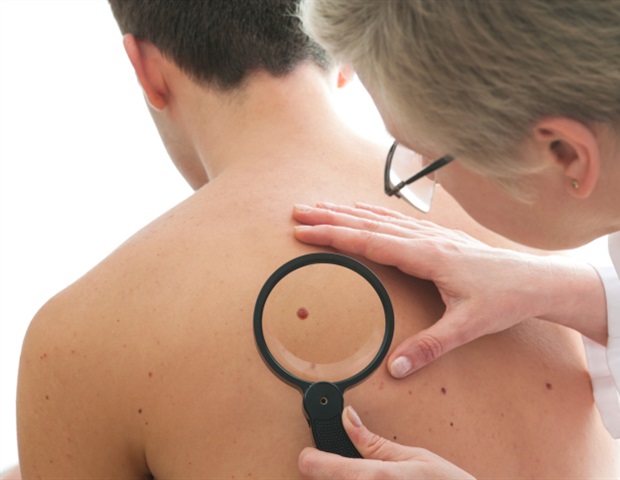[ad_1]

Pre-surgery treatment with the novel drug vidutolimod and the PD-1 checkpoint inhibitor nivolumab led to tumor control in 55% of patients with stage 3 cutaneous melanoma, according to the results of a single-arm phase 2 clinical trial led by the University of Pittsburgh, UPMC Hillman Cancer Center and the National Cancer Institute (NCI).
The findings, published in Cancer Cell, support the development of vidutolimod for treating cutaneous melanoma and provide important insights that could advance research on this drug for use in other cancers.
This is the first and only clinical trial so far to test the novel combination of nivolumab and the experimental drug vidutolimod in the neoadjuvant setting. It’s exciting that we saw a response rate of 55%, which is on par with currently approved immunotherapy combinations.”
Diwakar Davar, M.D., lead author, associate professor, Pitt School of Medicine and UPMC Hillman
Vidutolimod, which has not yet been approved by the U.S. Food and Drug Administration (FDA), targets the TLR9 pattern recognition receptor, which is a protein that plays a critical role in the initiation of innate immune responses to foreign threats. TLR9-targeting agents are often included in drugs and vaccines because of their immune-augmenting effects, but less is known about how they work in combination with other cancer therapies.
For this phase 2 clinical trial, 31 patients with high-risk stage 3 resectable melanoma received seven injections of vidutolimod into their tumors and three rounds of intravenous nivolumab prior to surgery. Following surgery, they continued to receive both drugs every four weeks for one year.
After pre-surgical therapy, 55% of patients responded so well that less than 10% of viable tumor cells remained in the surgical specimen, which previous research has shown is a good predictor of long-term survival in melanoma patients. The other 45% of patients had either partial (10-50% viable tumor) or no response (>50% viable tumor).
In the patients with the highest response rate to the combination therapy, the two-year recurrence-free survival rate and metastasis-free survival rate was 88% and 94%, respectively.
When the researchers compared tumors and blood from the high responding patients to those who didn’t respond as well, they found that plasmacytoid dendritic cells (pDCs) and myeloid cells were enriched in the former compared to the latter. pDCs augment the ability of T cells to eliminate tumors. Myeloid cells can suppress immune responses in tumors but can be targeted by multiple agents, including TLR agonists, to augment cancer immunotherapy. Neither pDCs nor myeloid cells are typically enriched in patients treated with nivolumab alone, so these observations suggest that vidutolimod stimulates anti-tumor immunity in a unique way.
In experiments led by Amanda Paulovich, M.D., of Fred Hutch Cancer Center and conducted as part of the NCI’s Clinical Proteomic Tumor Analysis Consortium, the researchers used a technique called mass spectrometry to show that most patients treated with vidutolimod and nivolumab had higher levels of key immune-related proteins, suggesting that unique signatures of TLR9 activation underlie the drugs’ activity.
“For any drug, it’s important to be able to measure proteins or markers that indicate whether a drug is working or not, which is known as a pharmacodynamic response,” said Davar. “It’s like when you put gas in the car, the gas meter goes up to indicate you have a full tank. Prior to this work, we did not have a pharmacodynamic parameter for TLR9 agonists and other innate agonists, so identifying a protein signature associated with TLR9 administration was a key finding.”
The team of investigators also analyzed the gut microbiome of the patients. Notably, the patients whose tumors shrank the most had higher levels of Gram-negative bacteria, bacteria that are not usually associated with response to anti-PD1 therapy, according to many other studies, including research by Davar and co-senior authors Hassane Zarour, M.D., professor at the Pitt School of Medicine and UPMC Hillman and Giorgio Trinchieri, M.D., chief of the Laboratory of Integrative Cancer Immunology at the National Cancer Institute.
“Our data suggest that the mechanisms by which the gut microbiome modulates responses to cancer immunotherapy may differ depending on the specific therapy,” said Zarour. “Such novel findings highlight the complexity and context-dependency of the gut microbiome’s effects in cancer immunotherapy and have prompted ongoing studies to confirm this observation.”
Other authors on the study are listed in the Cancer Cell manuscript.
Checkmate Pharmaceuticals (now owned by Regeneron Pharmaceuticals Inc.) provided funding support for the clinical trial. This research was supported by the National Institutes of Health (R01 CA257265, P50 CA254865, R01 CA222203, U01CA268806 and U01CA271407), the Melanoma Research Foundation Breakthrough Consortium Team Science Award and the Visium Spatial FFPE Challenge Award.
Source:
Journal reference:
Davar, D., et al. (2024). Neoadjuvant vidutolimod and nivolumab in high-risk resectable melanoma: A prospective phase II trial. Cancer Cell. doi.org/10.1016/j.ccell.2024.10.007.
[ad_2]
Source link


